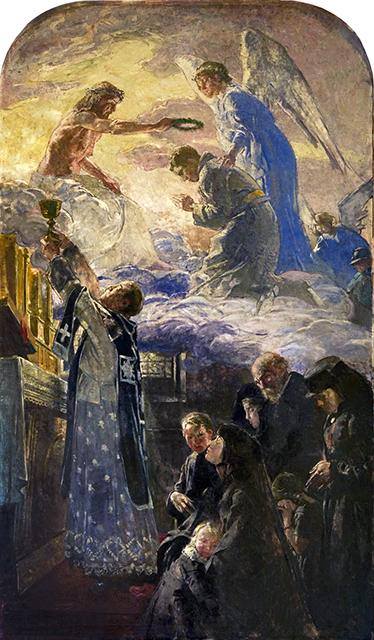Today is the Feast of All Souls.
No sin, no impurity can enter into the unveiled presence of the Triune Godhead. A person still attached to sin simply could not bear to be in the full presence of the Holy Trinity, could not look upon the face of God, and looking upon the face of God is what heaven IS. Therefore, those who die in a state of grace, in friendship with Christ, but still have attachment to sin (and almost everyone does), after their Particular Judgment, enter into Purgation to remove all remaining vestiges and attachments to sin before entering into the Beatific Vision. C.S. Lewis explained Purgatory to me very early on in my conversion process:
“Our souls demand Purgatory, don’t they? Would it not break the heart if God said to us, ‘It is true, my son, that your breath smells and your rags drip with mud and slime, but we are charitable here and no one will upbraid you with these things, nor draw away from you. Enter into the joy’? Should we not reply, ‘With submission, sir, and if there is no objection, I’d rather be cleaned first.’ ‘It may hurt, you know’ – ‘Even so, Sir.’
I assume that the process of purification will normally involve suffering. Partly from tradition; partly because most real good that has been done me in this life has involved it. But I don’t think the suffering is the purpose of the purgation. I can well believe that people neither much worse nor much better than I will suffer less than I or more. . . . The treatment given will be the one required, whether it hurts little or much.”
– C.S. Lewis, Letters To Malcolm: Chiefly on Prayer, chapter 20, paragraphs 8-9
Here is the eighth movement, “Hostias” from Mozart’s Requiem Mass. This is the last part of the Offertory:
Hostias et preces tibi, Domine, laudis offerimus:
We offer to Thee, O Lord, sacrifices and prayers:
Tu suscipe pro animabus illis, quarum hodie memoriam facimus:
Do Thou receive them in behalf of those souls of whom we make memorial this day.
Fac eas, Domine, de morte transire ad vitam,
Grant them, O Lord, to pass from death to that life,
Quam olim Abrahae promisisti et semini ejus.
Which Thou didst promise of old to Abraham and to his seed.

A Requiem Mass being offered for a soul by his family, who is exiting Purgatory and entering heaven and eternal bliss.
